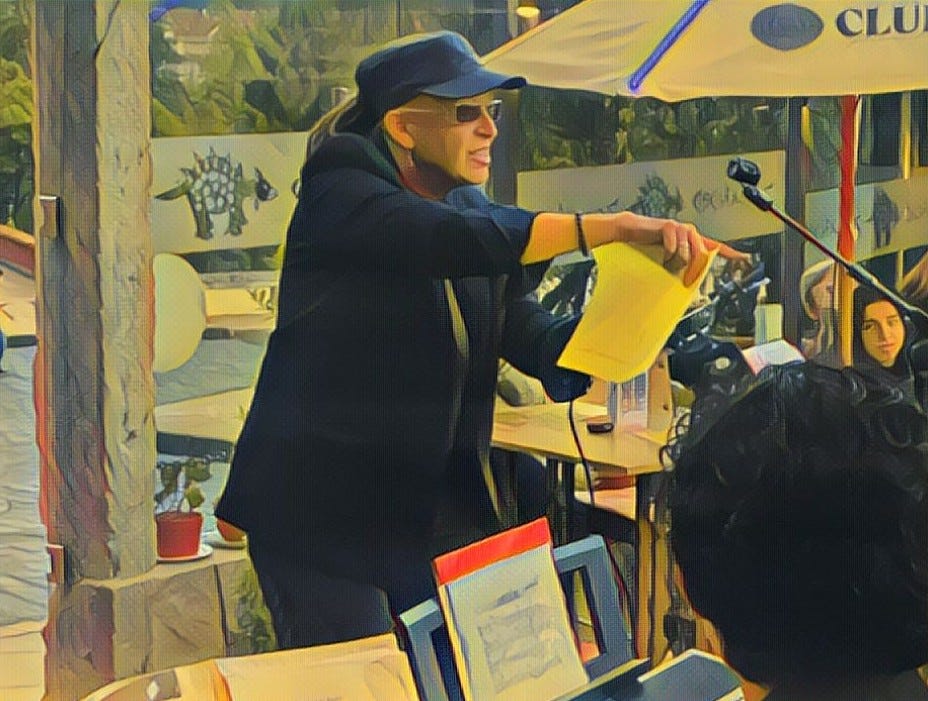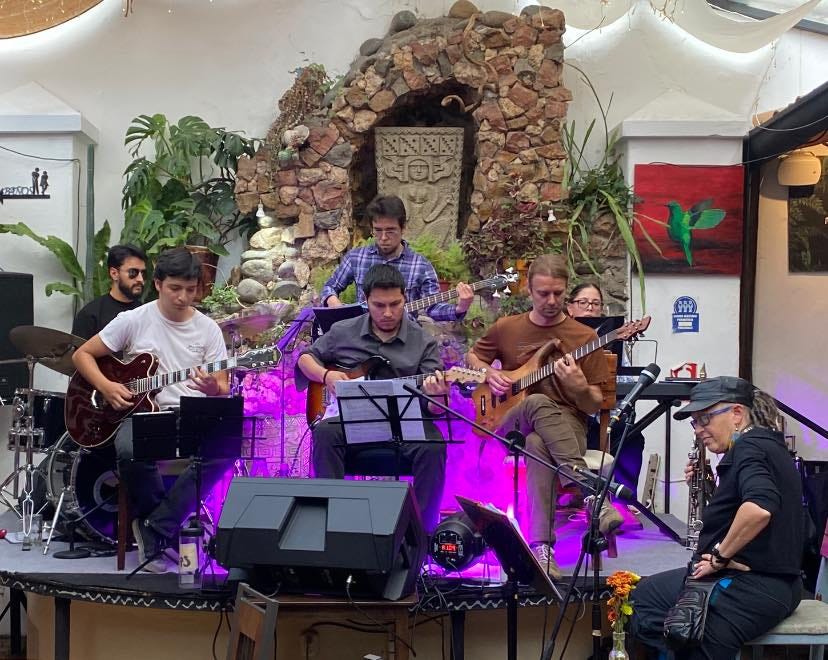Recently I received a couple of emails from young musicians who say they wish to study with me. One was from a young saxophonist who took one series of my workshops a few years ago, and I hadn't heard from him since.
The other was from a flutist who said she's heard a lot about me from one of my other students, and she wants to take private classes.
Their emails are extremely sycophantic. As if stroking my ego would inspire me to offer them classes for free.
Because the economic situation is not that great for students in Ecuador, I reply to students asking them what they can afford to pay for a private class. I charge for my classes not because the income is going to be at all meaningful for my own economy, but because they have to learn to pay for the knowledge they want. Otherwise they will not value it.
Additionally, someday they themselves will be teaching students, if they're not already, and I'm certain they will wish to be paid for their time and the transmission of knowledge they're imparting.
Personally, I come from a lineage of world-renowned jazz masters, most of whom are no longer living. I have A LOT to share concerning my professional experiences with these masters, as well as the knowledge that I've discovered on my own and developed into a cohesive and comprehensive approach to learning and developing one's craft and one's artistry.
Even if a student doesn't have actual money, there are other ways to pay a teacher. We always need help with things like social media marketing, making videos, collecting ticket money at the door, transporting equipment to gigs, etc. If a student can't afford lessons, they need to offer their time and/or expertise as an equivalent. In other words, a "work/study" situation. Do people not do this anymore?
I have lots of students who happily pay for my classes because they recognize the value there. They include talented pre-teens all the way up to the Concertmaster and section leaders of the Cuenca Symphony Orchestra. There is a core of repeat students who make it a point to take every single class or workshop I offer. I am training students who are already professionals, either in jazz, classical, or traditional music–as well as aspiring professionals. These are the students who are wise enough to know I'm not going to be around forever. Even if I am around forever, I'm not going to be teaching forever. It's something I'm doing right now, but it takes a lot of time and energy and someday I won't be able to invest that time and energy in teaching.
This is why I'm focusing on writing books now. I still want the knowledge to get out there, and I can reach a lot more people by writing books as opposed to teaching classes.
This Substack alone is a college course on the finer points of being an artist. Not only do I elucidate the path, but as mentioned, I also pass on knowledge I've received from my own mentors, who are legends.
Related articles from Temple of Artists
Jackie McLean: a never-before-published interview
More Questions About Jazz
To a Young Musician
My teacher Jackie McLean once told me this story about his mentor, Charlie Parker ("Bird"). He said he was walking down a New York street with Bird, who stopped suddenly in front of the window of a fish store. "Look!" said Bird, nudging Jackie, then a teenager, to look at the fish store window.
"What?" Jackie said. "It's some fish."
"No," Bird replied, "look at the colors!"
Jackie then realized that the sun was reflecting off the scales of the fish, turning them into iridescent rainbows. He had the epiphany that this is what it means to be an artist. You have to develop your sensibilities to the finest degree, so that you can perceive all the beauty there is in this world, and capture aspects of it in your art, whatever type of art it may be.
The students I consider really special are the ones who know that artistry is much more than knowledge and flawless technique. Knowledge and technique can be studied and learned. Artistry comes from the soul.
My student (and colleague) Luis Sigüenza traveled from Quito to come to my studio for a lesson a couple of years ago. He has my book Practice Like The Pros and said he'd heard I was living in Ecuador and he'd been trying to find me for years. Luis is already an accomplished player! When he came over I asked him what he wanted to work on in the lesson. "Whatever you want to show me," he said. My kind of student!
I was so impressed with Luis that I asked him to play with me in a performance for a new documentary on my life that will be released next year. So this is an additional perk for deserving students–they will get opportunities just by being associated with their teacher. When I first moved to New York at the age of 22, I already knew a lot of the masters because I had met them through Jackie, or Bish, or Jaki Byard, or Paul Jeffrey, or Paul Brown–all mentors of mine in college.
Here on Substack I have read other artists who say it’s all about the art, they have no responsibility toward the aspiring artists, the youth, their fans. To me this says they feel their art is all about themselves.
I don’t feel that way. Art must have a universal quality in order for it to communicate anything of value. An artwork that is only about its creator’s personal experience will die with its creator.
Especially in regard to performing artists like musicians, actors, dancers et. al., my viewpoint is that it is a privilege to be before the public in such a role. I honor my audience and my students by trying to uphold a lifestyle that reflects not only my own values, but also the values I claim to impart to my students. To me, this is part of the role of a mentor.
Remember the ancient spiritual axiom: When the student is ready, the teacher will appear. The teacher can take many forms. But all the forms originated with a master, a real person, who embodied the truths you seek. If you're lucky (and ready) enough to find a teacher who's right for you, sign up immediately!
Because, perhaps in the future there will only be AI mentors. Somehow I get a strong sense of foreboding from that possibility.
My new book has the following dedication: To my students - past, present, and future. Here’s an excerpt:
"There's another correspondence we must mention, and that is the relation of the known to the unknown. This relationship becomes especially important in improvised music, because the players who are spontaneously composing (‘spontaneous composition’ is a more accurate term than ‘improvisation’) must play what is unknown. That is, they must play things that have not been previously delineated. In order to do this, a good improvisor calls on their knowledge of compositional elements and techniques to express musical ideas that essentially come from the cosmos, but have been refined by humans over the centuries…
“Musical ideas expressed in spontaneous composition/improvisation are unknown to the player in advance, unlike ‘known’ elements such as notes and rhythms previously written down or otherwise codified. But because the principle of Correspondence exists, we’re able to extract elements of the unknown and make them knowable. What could be cooler than that?
“Conversely, it’s possible that known elements can disappear from that realm and retract into the unknown. This has happened countless times, as when a past civilization disappears and there is not even a record of it having ever existed. Then Graham Hancock goes to a place like Göbekli Tepe on an expedition, writes about the civilization in a book, does a TV show about it, and all of a sudden it’s common knowledge again!”







When I was 38 I wanted to improve my playing and sought out Richard Wilson in L.A. After weeks of leaving messages on his answering machine, I found out where he lived and drove from Venice to the Valley. About an hour through traffic. When I got there I saw a car parked in front of his house and figured he had a student so I waited. Eventually the student came out and I went to the door and told him who I was and that I had left him messages and wanted to study with him. He said lots of people want to study with him and why should he teach me. I told him because I wanted to play better. He said, "Really?" I replied, "Why else would I want to study with you?" He answered, "Lots of guys want to me to get them into studio work or they want to play with a certain popular band." I told him that I was already with a band and just want to play better. He said ok, and I took a lesson every two weeks for the next 2 yrs. By the end of the two years, I was blazingly fast and realized that speed isn't what I wanted, I wanted accuracy and the ability to play spontaneously whatever came into my mind. Fortunately, that was part of the package. It's also amazing what 6 hrs. a day with a metronome will do for your time and accuracy, although that did make it difficult to play with musicians whose time wasn't together. We went through about 5 bass players in a year until we found the right guy.
I am wanting to pass on my moderately eccentric and eclectic knowledge of music, gained as a DJ and enthusiast not as a musician, in the form of my collection and various bits’n’pieces of relevant printed material. However, I’m finding it tricky partially I think because there simply isn’t that much interest in my generally pre-digital and localized adventures. The exploring continues. Anyone with ideas about how to get this “stuff” to the right place, please feel free to let me know any old way that is convenient for you. I have been thinking in the direction of university archives of “pop” culture, but am wide open to anything practical.